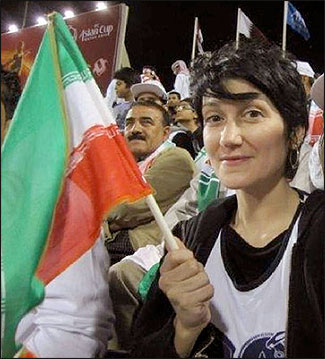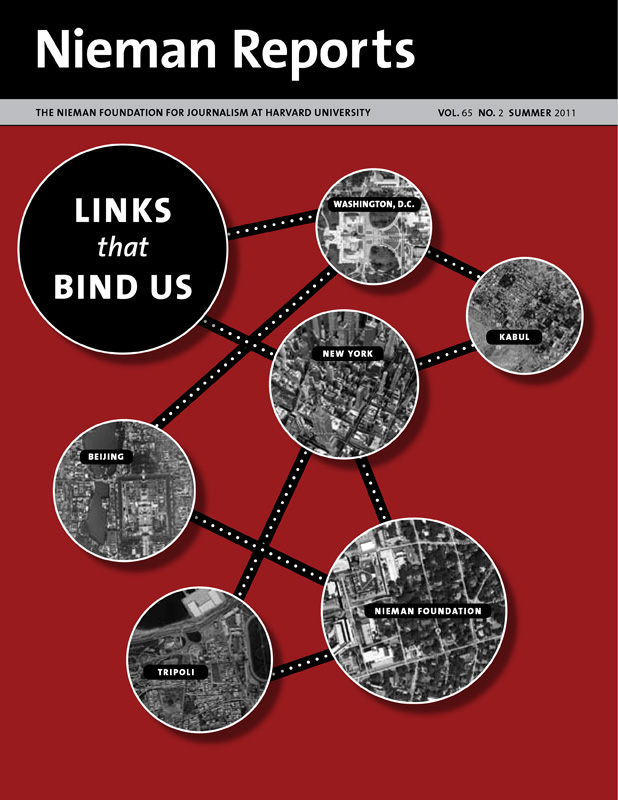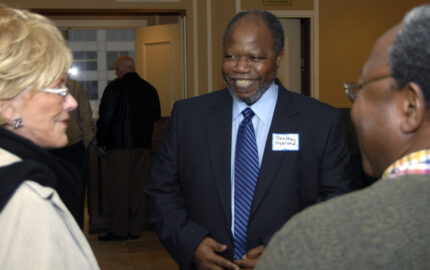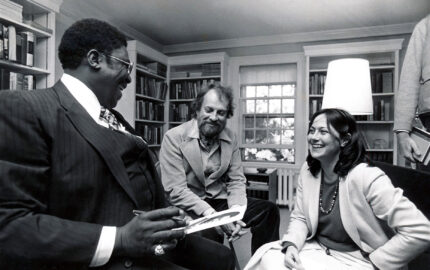
D. Parvaz roots for Iran, where she was born, during its victorious soccer match against Iraq in Doha, Qatar. Photo by Ben Piven.
Al Jazeera is the fomenter of revolutions or, as United States Secretary of State Hillary Clinton recently put it, "really effective … because it's real news"?
RELATED ARTICLE
“Feeling the Embrace of Her Nieman Family”
- D. ParvazGiven that I'm getting close to rounding off my first year at Al Jazeera, I can attest that Clinton's (almost) grudging praise/observation is on the mark. Not that anyone at the Al Jazeera headquarters here in Doha, Qatar was holding her breath waiting for a U.S. government official to give us the nod of approval.
Please. We're journalists.
But Clinton was right. Nestled in the dusty capital of a dusty country with a name most Americans can't pronounce, Al Jazeera is a news organization and a damned exciting one at that. Even if I was in a coma I'd find my gig here interesting. How could I not? A good chunk of the region seems to be in the throes of some sort of uprising, with my colleagues and me having a front seat to it all.
Shortly after I arrived last August, Al Jazeera released its WikiLeaks projects and content. We were one of the news organizations this whistle-blowing group chose to report on the Iraq War files—and the response was huge. This was also the first time WikiLeaks had leaked information to a Middle Eastern news outlet. Turns out that an audience member had suggested doing so to WikiLeaks founder Julian Assange when he spoke at the Frontline Club in London a few months earlier. Seems he took the advice to heart.
Then came the cholera outbreak in Haiti and the Palestine Papers, in which we exposed the extent to which the Palestinian Authority was willing to trade land rights with the Israelis, followed in rapid succession by uprisings in Tunisia, Egypt, Bahrain, Libya, Yemen, Syria and … .
We were miles ahead of other news outlets on Tunisia, and this set the tone for our coverage of subsequent uprisings. And we don't just cover the Middle East and the Muslim world; our reporters are in Mexico to cover the drug wars and in Antarctica to do stories about global warming. In March I was sent to Japan to report on the fallout from the devastating earthquake and tsunami.
Simply curating all of the content headed for the website can be a staggering task; reporters in the field file blog posts, tweet and send video, including exclusive interviews, for us to share online.
Since these revolutions broke out in Arab nations, our Web traffic has multiplied—by 1,000 percent—as people throughout the world have come to the website for stories and video clips. But they are also heading there to watch our live stream of Al Jazeera TV. Hey, it will have to do until people in the United States can get Al Jazeera English included in their cable and satellite provider packages.
AUTHOR'S NOTE
Full access to Al Jazeera English via cable TV exists in only a handful of cities, including Washington, D.C.; Burlington, Vermont; and Toledo, Ohio. Since February Al Jazeera has invited visitors to its website to join their Demand Al Jazeera campaign.
If all of this seems a bit rah-rah, forgive me. I guess the honeymoon is still on. This doesn't mean that there aren't moments of utter frustration with how things work here. But on most days I remember that I'm part of a newsroom that's still young and still growing, which means that it and those who run it aren't quite as entrenched in certain practices as management in an older news organization might be. People here are more open to pitches that come out of left field—they're hungry for ideas and experiments in coverage while still adhering to best practices.
I'd be lying if I said I wasn't surprised by this—I expected a slightly more conservative approach to things, and while there are some differences between the Al Jazeera newsroom and pretty much any other I've worked in, the basics are the same. This newsroom is a living organism, filled with hardworking, obsessive, competitive and at times, insufferable (hey, we know these things about ourselves, right?) journalists who sweat and breathe news and content. There is still that vital tug of war between reporters and editors that results in great content.
Despite the demanding shift structure required to feed a 24-hour news cycle, people show up on days off, come in early and leave late often without being asked, because not being in the newsroom when major stories break seems inconceivable. Just as in any other newsroom, each of us pitches and jockeys to get deployed to cover the story.
This is pretty heady stuff from the perspective of someone who has been observing the decline of Western media. Most U.S. news organizations have been downsizing and cutting back for years, and while there are signs that some are beginning to re-staff, it's doubtful that they'll invest in foreign bureaus and investigative journalism as they did in the past. It's heartbreaking to watch communities and beats go uncovered in hopes that the slack will be picked up—and done well—in blogs.
Having worked at the Hearst Corporation's Seattle Post-Intelligencer, which was shut down after 146 years of publishing, it's revitalizing to be in such a dynamic atmosphere at a crucial point in history. I can't imagine watching, say, Egypt, a country with centuries of history, taking its first halting steps as a democracy from any other vantage point.
D. Parvaz, a 2009 Nieman Fellow, is an online journalist for Al Jazeera English. She worked for the Seattle Post-Intelligencer, which shut down its print operations during her Nieman year.



